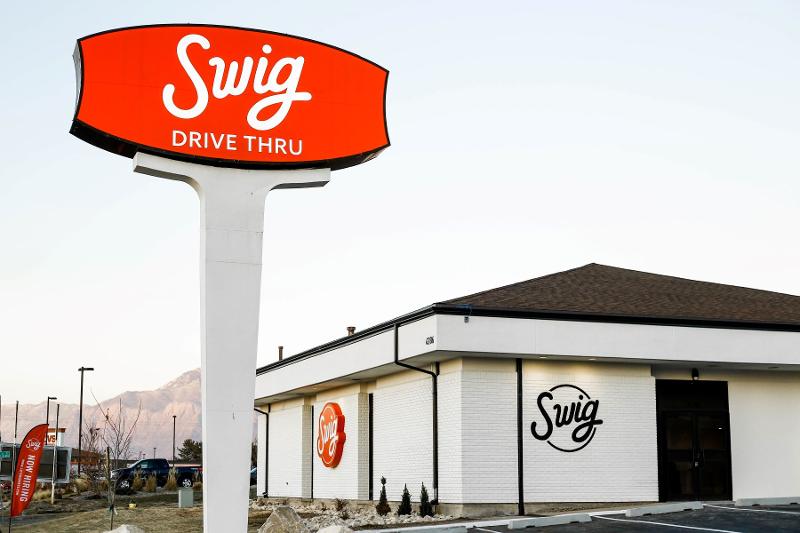
For a long time, the fast-food business was consumed with offering customers variety. Burger brands over the years have played with pizzas or tacos or salads. They sometimes co-located, fearing the dreaded “veto vote” to appease that one person in the car who wants chicken when everyone else wants tacos.
Not anymore. The industry is more specialized than ever. Customers are increasingly looking for their brands to only do one thing and do it well. If they want a beverage, they’ll go to a beverage brand. If they want a burger, they will go to a brand that specializes in burgers.
And that specialization isn’t limited to the menu. More restaurants than ever are specializing in service modes, meaning seats are no longer necessary.
The Technomic Top 500 Chain Restaurant Report reflects that specialization. Four of the six fastest growing fast-food chains are drive-thru-only concepts. Three of those four serve almost all drinks. The other one serves only salads.
(Check out the Technomic Top 500 ranking here.)
Scan the ranking and you’ll see fast-food chains that specialize in bubble tea, such as No. 341 Gong Cha, Italian Ice (No. 486 Jeremiah’s Italian Ice) or tea (No. 442 HTeaO). Even the sandwich chains are specialized, such as the grab-and-go healthy concept Clean Eatz (No. 400) and the stoner-centric Cheba Hut (No. 283).
Expand the category of fast food to include fast-casual chains and you get all kinds of specialization, as some of the most popular concepts have narrow menus, such as chicken fingers.
“If you want chicken fingers, you want to go to a restaurant that specializes in it and does it right,” Technomic Managing Principal Joe Pawlak said. “If you specialize, you’re in the catbird seat.”
(Check out the country’s 10 largest restaurant chains.)
Nowhere is this specialization more evident than in the business of drive-thru-only concepts.
In the 1990s, drive-thru-only concepts surged along with the growing popularity of that service format. But they would prove a little early for the fast-food-eating public, and chains like Checkers and Rally’s didn’t quite take.
Yet with drive-thru now more than 70% of business at many fast-food chains, and real estate difficult to come by, more existing brands started ditching seats in their prototypes. And new emerging concepts ditched seating from the get-go.
One notable example of this is Salad and Go, the drive-thru salad concept that emerged in Arizona and lured Charlie Morrison away from the hot wing concept Wingstop to be its CEO. Salad and Go is now a Top 200 chain (196), with more than $200 million in system sales after its sales grew 67.5% last year.
Almost all of that came from aggressive unit growth. But the chain also generated an impressive $1.9 million in average unit volumes last year.
Drive-thru beverages, meanwhile, are completely upending the coffee shop game. The fastest-growing chain in the U.S. last year was 7 Brew, which expanded aggressively last year, growing 267%. It now generates $191 million in system sales from 180 units, at least as of the end of 2023. And those units generate average sales of $1.7 million.
But 7 Brew is hardly alone. Scooter’s Coffee (No. 179) grew 44% last year. And the more established Dutch Bros grew 24%. It is now a top 50 chain (No. 48) with more than $1.4 billion in system sales.
Drive-thru beverages are also thriving outside of coffee. Swig is making its debut on the ranking this year at No. 493.
That growth came even as the largest beverage chains in the U.S. performed relatively well. Starbucks, though it has had sales problems so far in 2024, grew sales by 12.5% last year to $31.6 billion. Dunkin’ sales grew 5.7% to $11.9 billion.
That’s not even to mention the number of beverages available inside existing restaurants.
“Everyone has a beverage on their menu,” Pawlak said. “Everybody’s playing around with it. But these new players are coming out and doing well. Dutch Bros up 20%. 7 Brew, which is the fastest-growing chain above $200 million, 250% last year. Scooters up 41%. So it seems there’s still a lot of headspace there to grow.”
To be sure, the beverage chains do not necessarily have narrow menus. Many of them, led by Starbucks, have broadened their menu offerings to include a wider variety of beverages beyond simply hot coffee.
Starbucks last year added olive oil-infused coffee and then this year lavender drinks, boba-style beverages and energy drinks. Dutch Bros had a strong first quarter this year thanks to its introduction of protein coffee and boba.
And most of these chains enable their customers to customize their beverages. So, while the industry is introducing a variety of options, in the case of drinks in particular, brands are simply working to keep up with customers.
“It’s a really interesting time,” Christine Barone, CEO of Dutch Bros, said on a recent episode of the Restaurant Business podcast A Deeper Dive. “A lot of times the customer and come will share what that drink is. And I think that ability to create your own is something customers really do love.”
Members help make our journalism possible. Become a Restaurant Business member today and unlock exclusive benefits, including unlimited access to all of our content. Sign up here.
